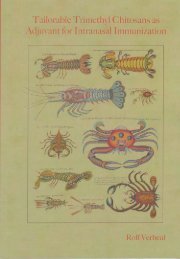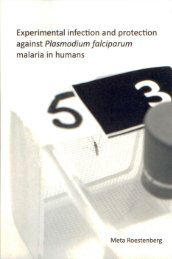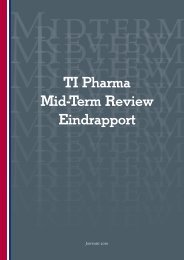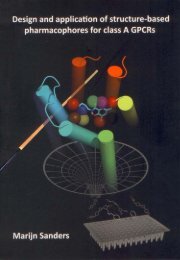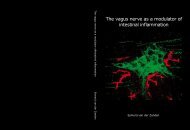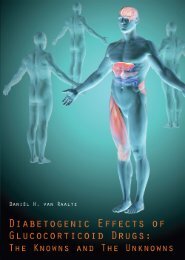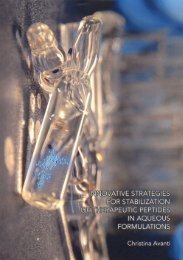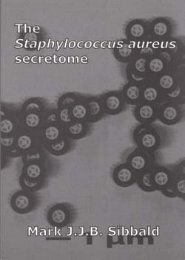Chromosome segregation errors: a double-edged sword - TI Pharma
Chromosome segregation errors: a double-edged sword - TI Pharma
Chromosome segregation errors: a double-edged sword - TI Pharma
You also want an ePaper? Increase the reach of your titles
YUMPU automatically turns print PDFs into web optimized ePapers that Google loves.
the mice did not receive any doxycycline, one third of the mice were given doxycycline in their drinking<br />
water from day 0 onwards, and one third of the mice received doxycycline in their drinking water<br />
from day 7 onwards. Clearly, tumor growth was reduced in the mice that received doxycycline in their<br />
drinking water (Fig.3A). Tumor growth was initially most efficiently inhibited in the group that received<br />
doxycycline on day 0, but almost all of the mice displayed progressive tumor growth (Fig.3A). Thus,<br />
the conditional inactivation of Mps1 that is achieved in this system is capable of slowing down tumor<br />
growth, but it is unable to fully arrest tumor growth. Whether this is due to incomplete inactivation of<br />
Mps1 in vivo is currently unclear. Alternatively, tumor cells in vivo might be less dependent on Mps1<br />
function for proper chromosome <strong>segregation</strong> than tumor cells grown in vitro. To analyze if tumors<br />
in vivo had lost the ability to shut down Mps1 expression in response to doxycycline, we isolated<br />
tumors from the mice that received doxycycline in their drinking water and analyzed their growth in<br />
vitro. Importantly, their viability and mitotic checkpoint function was again severely compromised<br />
when doxycycline was added to the culture medium, indicating that these cells had not simply lost<br />
conditional expression of the Mps1 shRNA (Fig.3B). However, this observation does not discriminate<br />
between the possibility that doxycycline does not efficiently reach the tumors in situ, or the possibility<br />
that in vivo tumor growth is less dependent on Mps1 function. In order to resolve this we will have<br />
to examine the effect of doxycycline on chromosome <strong>segregation</strong> in vivo. For this purpose we wish to<br />
perform intravital imaging of cell division of the xenografted tumor cells. Nonetheless, our data show<br />
that inactivation of Mps1 can partially inhibit tumor growth and suggest that targeting Mps1 function<br />
might be a useful anti-cancer strategy.<br />
Materials and Methods<br />
Tissue Culture, Transfections and Treatments<br />
LS174T cells were grown in DMEM (Lonza) with 10% Tet-approved FCS (Clontech), supplemented with<br />
pen/strep (Invitrogen) and ultraglutamine (Lonza). Taxol, MG132 and doxycycline (used at 1mg/ml) were<br />
from Sigma. LS174T cells expressing TetR were infected with retrovirus carrying pSuperior-retro-puro-<br />
Mps1 and selected with 2µg/ml puromycin. Single colonies were selected after replating 1-2 cells/well.<br />
Immunofluorescence Microscopy<br />
Cells plated on 12mm coverslips were harvested after 90 minutes MG132 treatment. Fixation<br />
was done using 4% PFA in PEM buffer. CREST was incubated O/N in PBS 3% BSA. Anti-human<br />
Alexafluor647 and DAPI were incubated in PBS 0, 1% Tween. Stained coverslips were mounted with<br />
Vectashield Mounting Medium (Vector). Images were acquired on a Zeiss 510 Meta confocal laser<br />
scanning microscope with a 63X/1.4NA Plan-ApoChromat objective using the Zeiss LSM software.<br />
<strong>Chromosome</strong> spreads<br />
Nocodazole was added for 4 hours to the medium to enrich for mitotic cells. Cells were treated with<br />
0.75 M KCl at 37ºC for 10 minutes, centrifuged at 2000 rpm and fixed for 20 minutes with Methanol:<br />
Acetic Acid (3:1). Fixation procedure was repeated 3 times. Samples were collected in Methanol<br />
and DAPI to stain for DNA. <strong>Chromosome</strong> spreads were created by allowing the drops to fall from<br />
30 cm height onto glass slides. Images were acquired as described above for Immunofluorescence.<br />
111<br />
<strong>Chromosome</strong> mis<strong>segregation</strong>s kill tumor cells<br />
5



